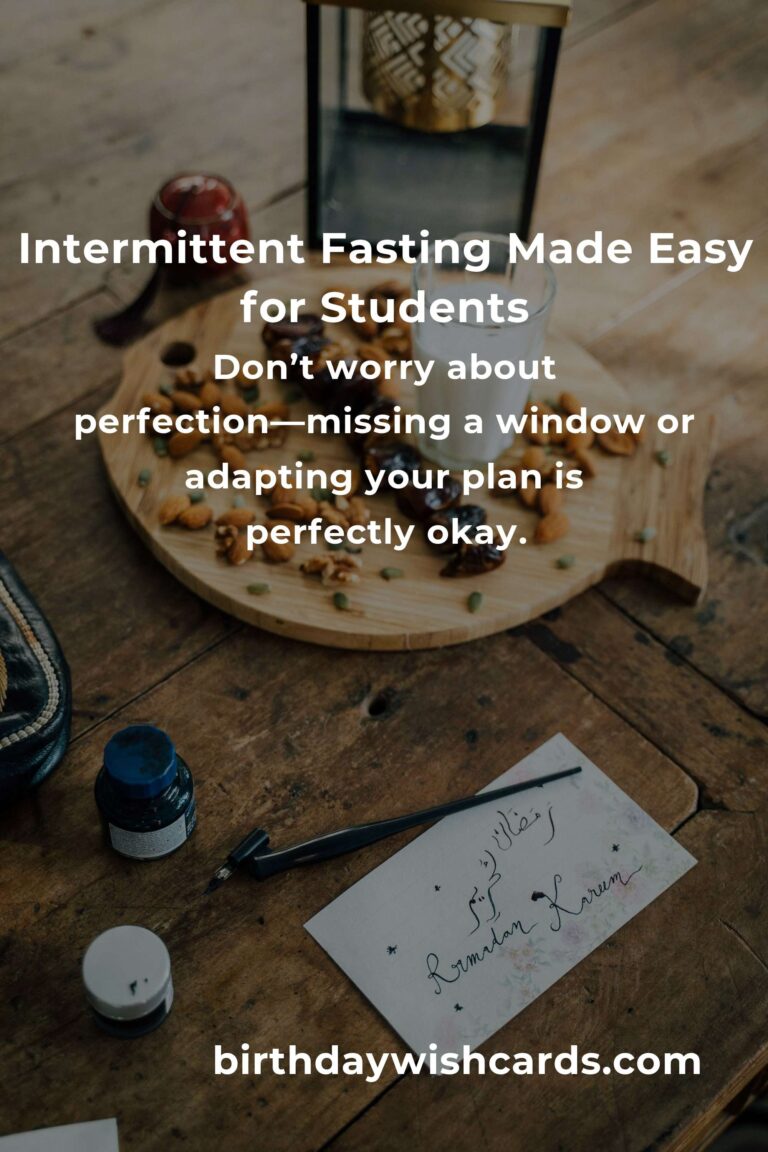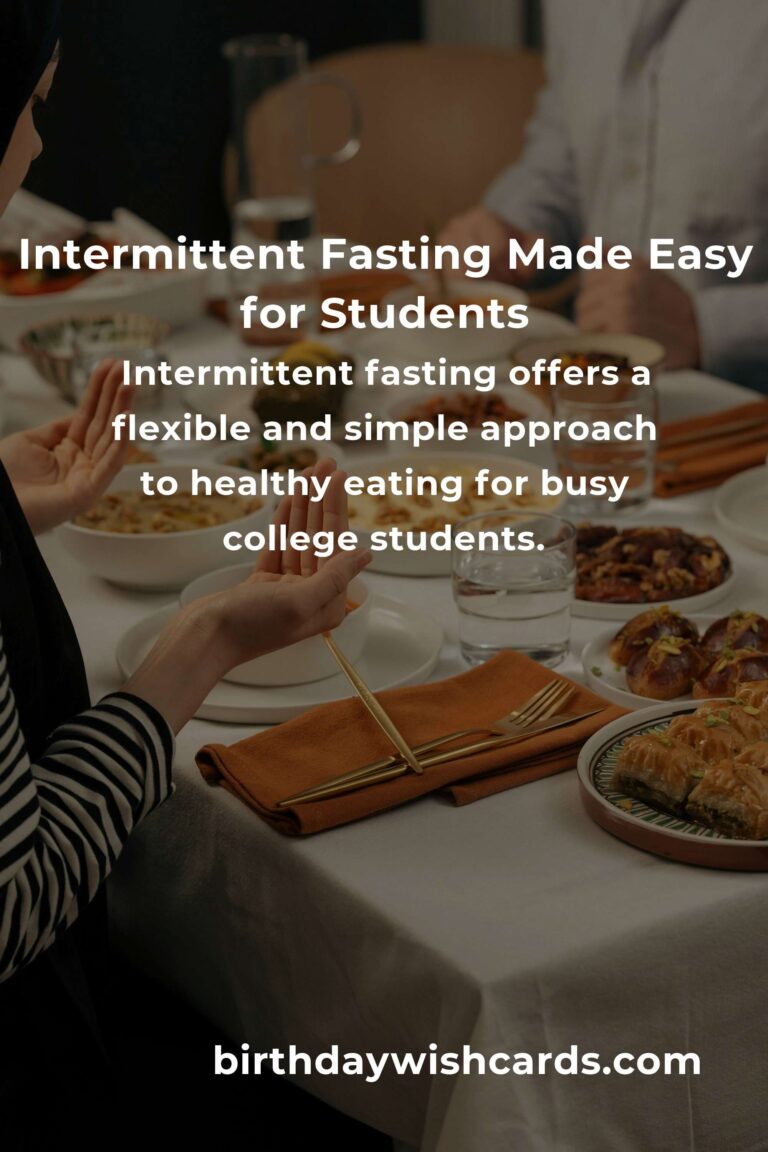
College life is vibrant, fast-paced, and often overwhelming. Between classes, assignments, work, and social obligations, healthy habits can easily slip through the cracks. But what if there was a way to boost your energy, sharpen your focus, and maybe even save a bit of money, all without adding more stress to your busy schedule? Enter: intermittent fasting. This simple, flexible eating pattern can be a game-changer for college students. Let’s dive into how you can make intermittent fasting easy, effective, and sustainable, even with a packed calendar.
What Is Intermittent Fasting?
Intermittent fasting (IF) isn’t a diet in the traditional sense—it’s a pattern of eating that cycles between periods of eating and fasting. Instead of focusing on what you eat, intermittent fasting focuses on when you eat. The result? Your body gets regular breaks from digestion, which can lead to numerous health benefits, like improved metabolism, better concentration, and even weight management.
Why Intermittent Fasting Is Perfect for Busy College Students
College students are always on the go. Skipping meals isn’t unusual, but doing it with intention can make a world of difference. Here’s why IF fits student life so well:
- Flexible Schedules: You can tailor IF to fit your classes, study sessions, and social life.
- Minimal Meal Prep: Fewer meals means less time spent cooking and cleaning.
- Improved Focus: Many notice sharper concentration during fasting periods.
- Budget-Friendly: Eating fewer meals can cut down your food expenses.
- Simplicity: No complicated calorie counting or food restrictions.
Common Intermittent Fasting Methods
There’s no one-size-fits-all approach to IF. Here are popular methods that work well for students:
- 16/8 Method: Fast for 16 hours, eat during an 8-hour window (ex: noon to 8pm).
- 14/10 Method: A gentler option—fast for 14 hours, eat during a 10-hour window.
- 12/12 Method: Fast for 12 hours, eat during a 12-hour window—perfect for beginners.
Most students find it easiest to skip breakfast and start eating around lunchtime, but you can adjust your window to fit your lifestyle.
How to Start Intermittent Fasting in College
Starting IF doesn’t have to be intimidating. Follow these steps to make it a breeze:
- Pick Your Method: Choose a fasting window that feels doable. Don’t be afraid to start small.
- Stay Hydrated: Drink water, black coffee, or unsweetened tea during fasting periods.
- Plan Your Meals: Think ahead about what you’ll eat during your window to avoid poor choices.
- Listen to Your Body: If you feel lightheaded or unwell, adjust your fasting schedule.
- Be Patient: It can take a week or two for your body to adjust. Give yourself grace.
Sample Intermittent Fasting Schedules for Students
Here are a few ways you can structure your fasting window around a typical college day:
16/8 Method
- Fasting Period: 8:00 pm – 12:00 pm
- Eating Window: 12:00 pm – 8:00 pm
- Tip: Have your first meal after morning classes, and finish dinner before evening study groups.
14/10 Method
- Fasting Period: 10:00 pm – 12:00 pm
- Eating Window: 12:00 pm – 10:00 pm
- Tip: Great for night owls who like a late snack while studying.
12/12 Method
- Fasting Period: 8:00 pm – 8:00 am
- Eating Window: 8:00 am – 8:00 pm
- Tip: Easiest for beginners; just avoid late-night snacking.
Tips for Success: Making IF Work with a Student Lifestyle
College life is unpredictable. Here’s how to make IF work, even when things get hectic:
- Be Flexible: If you have an early class or a late social event, adjust your eating window as needed.
- Keep Healthy Snacks Handy: When your eating window opens, have nutritious foods ready to go.
- Don’t Obsess Over Perfection: Missing your window occasionally won’t ruin your progress.
- Communicate with Friends: Let your roommates or friends know about your IF schedule so they don’t pressure you to eat outside your window.
- Use Technology: Apps like Zero, FastHabit, or Life Fasting Tracker can help you stay on track.
What to Eat for Best Results
Intermittent fasting isn’t about restricting foods, but what you eat during your window can impact how you feel. Aim for:
- Lean Proteins: Chicken, tofu, beans, eggs, or Greek yogurt.
- Whole Grains: Oats, brown rice, whole wheat bread, or quinoa.
- Fruits and Veggies: Pack your plate with color for vitamins and minerals.
- Healthy Fats: Avocado, nuts, seeds, and olive oil.
- Plenty of Water: Hydration is key, especially during fasting.
Try to avoid processed snacks, sugary drinks, and excessive caffeine, which can leave you feeling sluggish or jittery.
Addressing Common Concerns and Misconceptions
Will I feel tired or lose focus?
Maybe at first, but most find their concentration actually improves once their body adapts. If you feel weak, consider a shorter fasting window.
What if I have a demanding workout schedule?
You can schedule your workouts during your eating window, or try a smaller fasting window on heavy training days.
Is intermittent fasting safe?
For most healthy adults, yes. But if you have a medical condition, history of eating disorders, or are underweight, consult a healthcare professional first.
Will IF affect my social life?
It doesn’t have to! You can shift your eating window to include social events, or simply relax your schedule for special occasions.
Real-Life Stories: College Students and Intermittent Fasting
Let’s hear from real students who’ve made IF work for them:
- “I used to grab a muffin before my 8am class and crash by noon. Now I skip breakfast, focus better in the morning, and eat my first meal after class. I lost a few pounds and feel more energized.” – Jamie, 20
- “Meal prepping for two meals instead of three saves me time and money. I love the simplicity!” – Alex, 22
- “I was worried about missing out on late-night pizza with friends, but I just plan my window to include those nights—it’s all about balance.” – Priya, 19
Staying Motivated: Celebrate Small Wins
It’s easy to feel discouraged if you miss a window or have a tough day. Remember, intermittent fasting is a tool—not a test of willpower. Celebrate your progress, listen to your body, and adjust as needed. Even small changes can add up to big results over time.
Potential Downsides and How to Avoid Them
- Overeating in the Eating Window: Try to eat mindfully. Stop when you’re satisfied, not stuffed.
- Skipping Nutritious Foods: Make sure your meals include protein, healthy fats, and fiber to keep you full.
- Dehydration: Keep a water bottle handy and drink regularly.
- Fasting Through Stress: If IF ever feels overwhelming, take a break and reassess.
Frequently Asked Questions
Can I drink coffee or tea during my fast?
Yes! Black coffee and unsweetened tea are allowed during fasting periods. Just skip the sugar and creamers.
Will skipping breakfast hurt my grades?
No evidence says breakfast is essential for academic performance. Many find their morning focus improves with IF.
What if I’m starving during my fast?
Stay hydrated, distract yourself with activities, and remember your body needs a little time to adjust. If you’re still uncomfortable after a week, try a shorter fasting window.
Is intermittent fasting safe for everyone?
Not always. If you have certain health conditions, consult your doctor before starting IF.
Final Thoughts: Make IF Work for You
Intermittent fasting can be a powerful ally for busy college students. It’s flexible, simple, and can fit right into your unpredictable schedule. Remember, the goal isn’t perfection—it’s progress. Listen to your body, find a rhythm that works, and give yourself the grace to adapt as needed. With a little patience and planning, you’ll discover a healthier, more energized you—ready to take on college life with confidence.
Intermittent fasting offers a flexible and simple approach to healthy eating for busy college students.
It can help improve focus, boost energy, and even reduce food expenses when done thoughtfully.
Choosing a fasting method that suits your unique schedule is key to long-term success.
Staying hydrated and planning balanced meals during your eating window can make fasting easier.
It’s normal to need a week or two to adjust—patience and self-compassion are important.
Social life and academics don’t have to suffer with IF; just be flexible with your windows.
Real students have found IF saves time, money, and even helps them feel more energized.
Don’t worry about perfection—missing a window or adapting your plan is perfectly okay.
Focusing on whole foods and hydration will help you avoid common pitfalls like fatigue or overeating.
With a little planning and self-awareness, intermittent fasting can become a rewarding and sustainable part of college life.
#IntermittentFasting #CollegeHealth #StudentWellness #BusyStudentTips #HealthyHabits #SimpleNutrition #FastingForFocus #StudentLifeHacks

